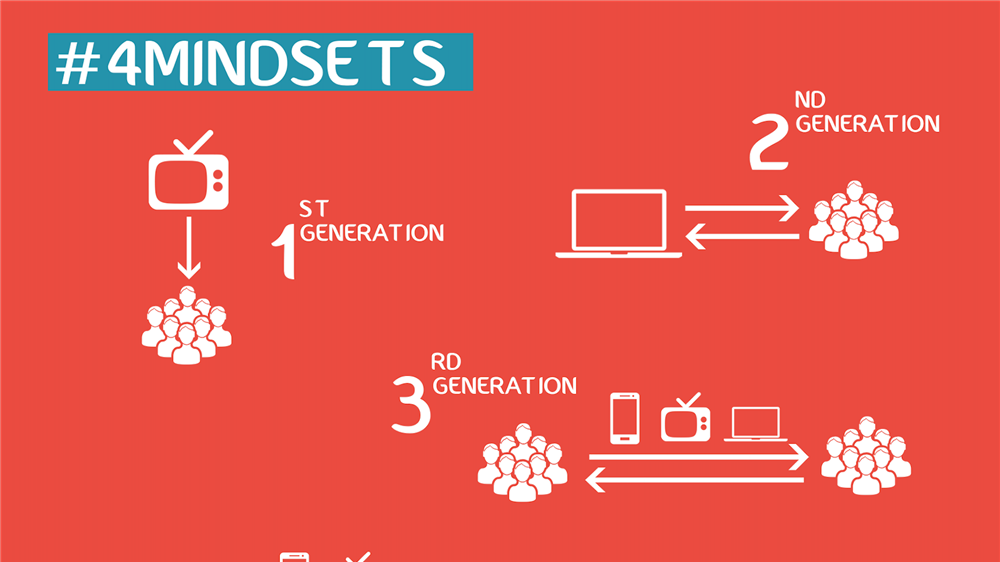سؤال يجيب عليه مؤسس الفيسبوك "مارك زوكربيرج" بالنفي المطلق دون أي تردد.
في محاولة إقناع السائل، يضيف مارك بأن الفيسبوك لا ينتج المحتوى كما تفعل المؤسسات أو الشبكات والشركات الإعلامية، ففيسبوك يعمل كمنصة "محايدة" في ربط الناس والعالم، ويتيح إمكانيات جديدة للتواصل وإنتاج المحتوى وتوزيعه بشكل غير مسبوق (1). وعليه فلا يعتبر مارك الفيسبوك منصة إعلامية أو بالأحرى لا يريد أن يضعها تحت ذلك التصنيف لأسباب يمكن بحثها وتناولها في مقال منفصل.
وبالعودة للسؤال، دعونا نستعرض أهم الوظائف أو الخدمات الإعلامية التي يقدمها الفيسبوك:
1- التدفق الإخباري " News feed":
الرسالة تكمن في العنوان، لماذا حرص الفيسبوك على إيجاد شريط أو تدفق إخباري لكل حساب أو مواطن فيسبوكي؟
لعل الفيسبوك أدرك ومن واقع التجربة والخبرة المتراكمة أن "الأخبار" هي الخبز الذي يدفع بالمستخدم للزيارة اليومية، لكن الفيسبوك وبذكاء غير مسبوق، استطاع أن يغير طريقة صناعة الخبز وطريقة الحصول عليه ومن ثم تناوله واستهلاكه.
هنا لابد لنا من الإشارة إلى أهم المتغيرات التي أحدثها الفيسبوك على التدفق الإخباري:
-
الأخبار بطريقة غير خطية.
-
الأخبار تصلك حيث أنت: لا حاجة للانتقال إلى البحث عنها في أماكن مختلفة.
-
دمج الأخبار الرسمية وغير الرسمية في شريط أو تدفق مشترك: سواء أكانت هذه الأخبار ناجمة عن مؤسسات إعلامية أو مؤسسات وشركات ربحية وغير ربحية، أو الأخبار القادمة من الأصدقاء والشخصيات. الأمر الذي أحدث فارقاً مهماً وغير مسبوق في التناول الخبري على صعيد الأشخاص والشركات والمؤسسات.
-
نشرة أخبار خاصة لكل مستخدم: يقوم الفيسبوك بالعمل على تقديم الأخبار والمعلومات بشكل خاص وشخصي لكل مستخدم، بينما تترك مهمّة اختيار الأخبار والمحتوى لـ "الخوارزميات" والبرمجيات الذكية التي تدرس كل شخص على حدة، يدخل في تلك الخوارزميات معايير كثيرة لا يفصح عنها الفيسبوك بحجة أنها تتجاوز الـ100 ألف عامل. لكن اللافت هنا هي القدرة الخارقة على إعادة إنشاء وتزويد "نشرات اخبارية" لأكثر من مليار و800 مليون مشترك بشكل فردي وخاص وليست نشرة عامة للجميع كما هو الحال في الإعلام التقليدي.
تجدر الإشارة هنا إلى ضرورة مراعاة "سلوك المستخدم" (user behavior) الذي أحدثه الفيسبوك لدى ساكنيه، حيث أن طريقة استقبال الأخبار والتعاطي معها والمشاركة في نقدها أو التفاعل معها، أحدثوا تغيراً جذرياً لدى المتلقي (مع تحفظي على وصف أو مصطلح "المتلقي" (الذي تم استخدامه للضرورة التوضيحية فقط) وأوجد أنماطاً وأشكالاً متجددة لم تعد صناعة الأخبار بالطريقة التقليدية مستساغة أو جاذبة لديه.
2- الجدول الزمني (Timeline) وصناعة الذاكرة والتذكير:
يحرص الفيسبوك وبشكل لافت على صناعة الذاكرة أو الذكرى الشخصية والمجتمعية والكونية، عليه أوجد ما يطلق عليه بالجدول الزمني لكل حساب أو ما قد نطلق عليه "العمر الرقمي" في مملكة الفيسبوك.
ما يميز هذه الذاكرة أو الذكرى ليس فقط قدرتها الهائلة على تخزين أنواع الذاكرة المختلفة نصاً كانت أم صورا وفيديوهات، بل تتعدى ذلك لتخزين أنواع العلاقات والمشاعر وعلاقة الأشياء ببعضها البعض وصولاً لرصد وتخزين الأفعال والأقوال والأحوال والمشاعر وحديث النفس، كسؤال الفيسبوك "بماذا تفكر؟".
ذاكرة لا تموت
يمارس الفيسبوك عمليات التذكير والتنبيه ليس لعيد ميلادك السنوي فحسب، بل للمحتوى اليومي الذي تفاعلت معه أو قدمته في نفس اليوم من السنة أو نفس المكان الذي زرته أو عند لقائك بشخص معين أو حتى عند استحضارك لشيء ما في المستقبل.
اذاً هنالك قدرة هائلة لدى الفيسبوك على ممارسة عمليات التذكير بطرق غير مسبوقة في التأثير والاستحواذ على عقل وقلب المستخدم. هنالك فارق كبير بين حفظ الذاكرة المجردة والقدرة على ممارسة عمليات التذكير لما يقرب من ملياري شخص بشكل خاص ونوعي وبشكل يومي أو آني في نفس اللحظة.
لنا أن نتخيل ما الذي يحدثه التذكير من تفكير واستفزاز أو استنهاض للعقل بضرورة التفاعل مع محتوى الذاكرة سواء أكان:
- محتوى ماديا مجردا
- محتوى علاقاتيّاً
- محتوى مناسباتيَاً (موسميّاً)
- محتوى شعوريّاً.
نحن أمام نوع أو أنواع جديدة من المحتوى لا يتوقف عند المحتوى البصري أو المسموع، بل يتجاوزه لمحتوى إنساني جديد أو محتوى ناتج عن الآلات أو ناتج عن مكونات الكون المختلفة من حركة الحيوانات أو النباتات أو حركة السحب والرياح وما حولنا في الأرض أو الفضاء.
3- صناعة أو "خلق الوسط" وملكيته المطلقة.
منذ البداية، لم يرغب فيسبوك في أن يكون طرفاً أو واقعاً في التصنيف التقليدي للعملية الإعلامية والتي تتحدث عن ثلاث مكونات رئيسية:
- المرسل
- المستقبل
- وسيلة الاتصال أو الوسيط
حرص الفيسبوك أن يخلق الوسط (The Medium) الذي يتفاعل من خلاله المرسل والمستقبل مع تراجع ملحوظ لدور الوسيط التقليدي أو وسيلة الاتصال بوظائفها التقليدية. وبذلك يمكن لنا أن نصف الفيسبوك بأنه ولد أو بدأ مع بداية الجيل الثالث في التحول الإعلامي ومنظومات الاتصال التي انتبهت إلى ضرورة البعد عن الطرف والإستحواذ على الوسط الذي يربط الناس والمؤسسات ببعضها البعض. مع ضرورة الانتباه هنا إلى دخوله في الجيل الرابع والذي تدخل فيه اللآلات في تفاعلات حية وذكية مع بعضها البعض ومع البشر لإنتاج مجتمعات كونية رقمية هجينة ستغير أشكال التواصل والإعلام بشكل جذري.

قد يتبادر إلى الذهن بأن الفيسبوك ما هو إلا وسيلة اتصال، وهذا الأمر قد يخالجه نوع من الصحة بالنظر إلى التعريف التقليدي للوسيلة أو الوسيط. لكن الفيسبوك بات له دور في "استملاك" الوسط والتدخل المباشر وغير المباشر في صناعة وتوزيع ونشر المحتوى وفق قواعد وقوانين متجددة وغير ثابتة.
امتلاك الوسط أتاح للفيسبوك قدرات غير مسبوقة لا تقتصر على عمليات إانتاج واستهلاك المحتوى ونشره فحسب، بل تجاوز ذلك في الدخول إلى مربعات كانت مظلمة أو لم تكن متاحة لمؤسسات الإعلام التقليدي.
من يملك الجمهور؟
ومجددا فإن امتلاك الوسط وما يحيط به قد أتاحا للفيسبوك نقل الملكية النسبية للجماهير من المؤسسات الإعلامية واللاعبين الكبار إلى من يملك الملعب، فصاحب الملعب اليوم هو الذي يحدد المشاركين في اللعب وكيفية اللعب وما هي أسس وقواعد اللعبة.. فالفريق الذي يلعب لن يتمكّن من التواصل مع جماهيره إلا من خلال مالك الوسط الذي أصبح هو المالك الرئيسي للمنظومة وما ينتج عنها أو من خلالها، ومن يحظى بـ 100 مليون معجب أو متابع، لا يستطيع التواصل معهم متى شاء دون السماح له بذلك من قبل المالك الرئيسي الذي يملك القدرة منفرداً بتوصيل ما يشاء وكيفما يشاء.
4- تغيير قواعد الصناعة
لا يقتصر دور الفيسبوك في توفير"الوسط" للتفاعل بل يتقدم بشكل لافت في تغيير قواعد الصناعة على عدة مستويات منها:
-
الرصد والمتابعة والبحث والاستكشاف.
-
النشر والتوزيع (أكبر موزع للأخبارعلى شبكة الإنترنت).
-
الدعاية والترويج.
-
القياس وتحديد معايير النجاح.
-
إدارة المعلومات الضخمة أو "إدارة المعرفة الكونية".
-
الفهم الدقيق للجماهير وإدارة الحوار معها.
-
الانتقال من المحتوى المجرد إلى المحتوى المخدوم.
-
البث المباشر ونقل الحدث وما حوله (كماً وحجماً ونوعاً بشكل غير مسبوق).
-
صناعة ونقل المحتوى بالواقع الافتراضي (Virtual Reality) ودمجه بالواقع المعزز (Augmented Reality) والواقع الحقيقي.
-
التقدم في التفاعل مع الآلات والذكاء الاصطناعي (Artificial Intelligence) الذي يمكن أن يغير صناعة الإعلام بشكل جذري.
إذا لم يكن الفيسبوك شبكة إعلامية، فماذا يمكن أن يكون؟
يجيب المؤسس زوكربيرج بأن الفيسبوك هو شركة تقنية بامتياز تسعى إلى ربط الناس من خلال شبكات التواصل الاجتماعي أو ما يشبهها من تقنيات وتطبيقات.
وهذا الأمر لا غبار عليه إذا ما نظرنا إلى ما ينتجه الفيسبوك من تحديثات وخدمات مبنية على الاستثمار المميز في البرمجيات ومراكز الأبحاث والاستحواذ على الشركات التقنية. بل يتقدم فيسبوك في منافسة العمالقة الكبار في صناعة تقنيات المعلومات والتقنيات الحديثة في عالم الاتصالات والربط الرقمي والإنترنت وتقنيات الإعلام والاتصال من حيث إدارة المحتوى ونشره وتوزيعه وإعادة إحيائه.
من الناحية التقنية، لعلني أرى بوضوح كيف يمكن للفيسبوك أن ينافس أو يتغلب على عملاق التكنولوجيا غوغل، ليس فقط على مستوى التواصل الاجتماعي فحسب بل في تقنيات وخدمات محركات البحث في الأجيال القادمة والتي أتنبأ فيها للفيسبوك بعمل ثورة غير مسبوقة قد يصعب على اللاعبين الكبار مجاراتها أو اللحاق بها.
بيد أن محاولة اختزال وصف فيسبوك بالشركة التقنية أو الإعلامية لا أراه منصفاً أو محيطاً بماهيته ووظائفه المتعددة والمتجددة، فرغم تفوقه على الصعيدين التقني والعلمي وعلى المستوى الإعلامي سواء أكان بوظائفه التقليدية أو الجديدة، فإن الوصف الذي أميل له هو أن "الفيسبوك إمبراطورية رقمية كونية" تعيد تشكيل قواعد صناعة الإعلام والتقنيات بقيادتها إعلاما مغايرا يمكن أن نطلق عليه مجازاً بـ "الإعلام الذكي" في الحياة الرقمية المتجددة.
هامش
(1) مقابلة وتصريحات مارك زوكربيرج في لقائه المفتوح في روما بتاريخ 29 أغسطس/آب 2016
https://www.facebook.com/zuck/videos/10103066366848051








































